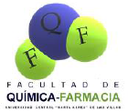Executive Secretary

VII Simposio Internacional de Ciencias Farmacéuticas 2019
VII SICF
Resumen
Marine ecosystems are a promising source of living organisms that exhibit a wide spectrum of applications in the field of Biomedicine since they are sources of compounds with multiple biological activities such as antimicrobial, antifungal, antioxidant, antitumor, antiviral, among others. Marine algae have a varied biochemical composition and are able to synthesize metabolites with antiviral activity, among which flavonoids, tannins, peptides and polysaccharides such as carrageenans, alginates, fucans, laminarians and others stand out. These properties make them potential candidates for the search and development of drugs against viral diseases that show resistance to established drugs or lack of any therapy The Virology group of the University of Havana, has extensive experience in the investigation of the antiviral activity of natural products, including some derivatives of seaweed. The aim of this work is to determine the antiviral activity of different marine algae species in cell cultures. Among the viruses used are enterovirus, dengue virus and herpes virus. This work supports the antiviral potential of some species of marine algae based on the results achieved through the use of a preclinical research methodology established by our research group. The results obtained include the presence of antiviral activity, against several viral groups, of extracts obtained from algae species of the genera Sargassum and Laurencia, among others.
Abstract
Marine ecosystems are a promising source of living organisms that exhibit a wide spectrum of applications in the field of Biomedicine since they are sources of compounds with multiple biological activities such as antimicrobial, antifungal, antioxidant, antitumor, antiviral, among others. Marine algae have a varied biochemical composition and are able to synthesize metabolites with antiviral activity, among which flavonoids, tannins, peptides and polysaccharides such as carrageenans, alginates, fucans, laminarians and others stand out. These properties make them potential candidates for the search and development of drugs against viral diseases that show resistance to established drugs or lack of any therapy The Virology group of the University of Havana, has extensive experience in the investigation of the antiviral activity of natural products, including some derivatives of seaweed. The aim of this work is to determine the antiviral activity of different marine algae species in cell cultures. Among the viruses used are enterovirus, dengue virus and herpes virus. This work supports the antiviral potential of some species of marine algae based on the results achieved through the use of a preclinical research methodology established by our research group. The results obtained include the presence of antiviral activity, against several viral groups, of extracts obtained from algae species of the genera Sargassum and Laurencia, among others.
Sobre el ponente

Dr. Annele Roque Quintero






